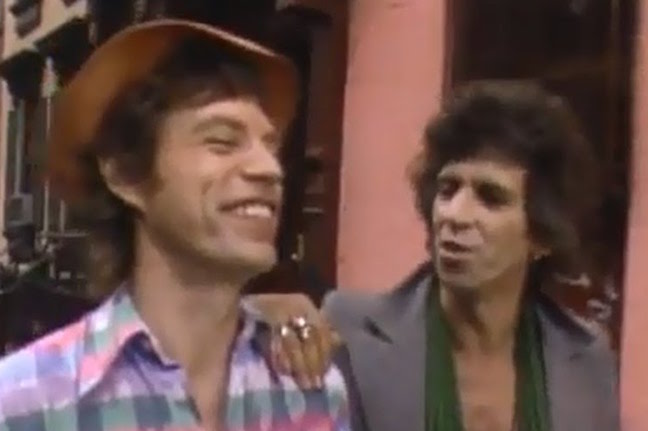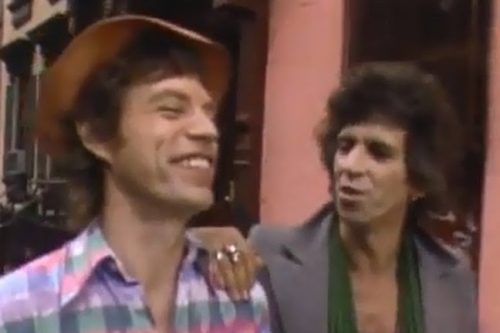
Let’s say you’re a rock musician in the studio. You’re working on a song, and you’re feeling that you’d really like a saxophone solo with a Sonny Rollins feel. Your two basic options are: See if someone in your band can come close, or go out and hire a session player who can get somewhere in the right neighborhood.
But if you’re one of the biggest bands in the world, you have a third option: Get the man himself to do the playing.
That’s what the Rolling Stones did on their 1981 single “Waiting on a Friend.” And that’s what classic rock musicians have done, from time to time over the decades, when they’re looking for a certain sound, and they have enough cash, or prestige, or plain old luck, to be able to hire an iconic musician they feel would be perfect for the job.
Here are 10 examples, in chronological order, of rock and pop records enhanced by a major name in the jazz world.
10) “Night Game,” Paul Simon with Toots Thielemans on harmonica, from Still Crazy After All These Years (1975)
One of Simon’s oddest and most obscure songs, “Night Game” is about a pitcher who doesn’t just blow the game, but actually dies on the mound. Surely this is a metaphor for something, but what exactly, it’s hard to say. You won’t really miss much if you skip forward to Belgian harmonica master Thielemans’ lovely, sweetly melodic solo at the 1:34 mark. Thielemans, who died August 22, 2016 at the age of 94, actually worked quite a bit with Simon, touring with him in 1975 and making television appearances with him on Saturday Night Live and The Paul Simon Special (both in 1977).
9) “As,” Stevie Wonder with Herbie Hancock on electric piano, from Songs in the Key of Life (1976)
Wonder had a number of high-profile guests on his masterwork Songs in the Key of Life, including George Benson, Minnie Riperton and Deniece Williams, but Hancock makes, arguably, the biggest impact, playing a Fender Rhodes on “As.” Just listen, at the 2:50 mark, to his solo—whose gritty flavor seems to inspire a vocal explosion from Wonder when he begins singing again—or to his funky embellishments four minutes into the song.
8) “Aja,” Steely Dan with Wayne Shorter on tenor saxophone, from Aja (1977)
There is a jazz influence in much of Steely Dan’s work, but Donald Fagen and Walter Becker never showcased it as much as they did on “Aja,” the title track of their multiplatinum-selling 1977 album. Shorter—well known at the time as a Weather Report member and a former Miles Davis collaborator—comes in at the 4:43 mark of the eight-minute song and dominates for the next minute, pushed by Steve Gadd’s assertive drumming. “It took a while, as I recall, to persuade him to come down and do it,” Becker once said. “I think he felt the chances were we would be asking him to do something that was not particularly appropriate (for him), a reasonable fear under the circumstances.
7) “Just the Way You Are,” Billy Joel with Phil Woods on alto saxophone, from The Stranger (1977)
One of the corniest pop ballads ever is redeemed, at least a little, by Woods’ tasteful fills and lushly romantic solo. Woods’ career also included guest appearances with Steely Dan (“Doctor Wu”) and Paul Simon (“Have a Good Time”); Joel once said that his work on “Just the Way You Are” took it “to a whole other stratosphere. All of a sudden, now it wasn’t just a lounge ballad. It was potentially a jazz classic. … It’s just the way the guy blows. His phrasing, his sound, the notes he picked, how he got to those notes. I don’t know how he does it.”
6) “Street Player,” Chicago with Maynard Ferguson on trumpet, from Chicago 13 (1979)
Chicago does disco? Not a particularly good idea. And indeed, Chicago 13 was a dud—the first album of the band’s career not to yield a hit single. But this was not the fault of Ferguson, whose distinctive high notes enliven the album’s opening track, the nine-minute “Street Player.”
5) “Guilty,” Lou Reed with Ornette Coleman on alto saxophone, from The Raven (2003)
“THIS IS ONE OF MY GREATEST MOMENTS,” wrote Reed, in caps, about free-jazz innovator’s Coleman’s guest appearance on “Guilty” from The Raven, Reed’s two-CD exploration of the works of Edgar Allan Poe. The normally deadpan Reed also enthused, at loureed.com/guilty, “He did seven versions—all different and all amazing and wondrous.” Coleman was a major influence on Reed, who often saw him perform in Greenwich Village in the 1960s. “I had had this idea when I first discovered electric guitar: Wouldn’t it be incredible if you could play like Ornette Coleman on the guitar?” Reed told Creem magazine in 1980. “That was some of the initial attack—something like ‘European Son’ (from Reed’s groundbreaking 1967 album with the Velvet Underground, The Velvet Underground and Nico) grew out of that thing.”
4) “Shipbuilding,” Elvis Costello and the Attraction with Chet Baker on trumpet, from Punch the Clock (1983)
Punch the Clock is Costello’s frothiest pop album, but it’s grounded by “Shipbuilding,” an anti-war song featuring Baker’s heartbreakingly mournful trumpet. Costello offered the job to Wynton Marsalis first, but Marsalis wasn’t available, so Costello attended a Baker nightclub gig, introduced himself (Baker had never heard of him) and asked if Baker would do it. Baker, whose career wasn’t exactly flourishing at the time, agreed immediately.
3) “Oh Patti (Don’t Feel Sorry for Loverboy),” Scritti Politti with Miles Davis on trumpet, from Provision (1988)
The British new wave band Scritti Politti landed perhaps the biggest fish of them all, Miles Davis, to play on their 1988 single “Oh Patti (Don’t Feel Sorry for Loverboy),” a Top 20 hit in England, though it didn’t chart in the United States. This wasn’t just a random studio gig for Davis: He admired Scritti Politti’s music enough to include his version of their song “Perfect Way” on his 1986 album Tutu, and after that, he and SP frontman Green Gartside became friends.
2) “The Road,” Everything But the Girl with Stan Getz on tenor saxophone, from The Language of Life (1990)
Ben Watt of the British duo Everything But the Girl grew up listening to jazz—his father was a jazz musician—and had a particular affinity for the jazz/bossa nova albums Stan Getz and João Gilberto made in the 1960s. The sound of EBTG, in fact, is sort of a pop-oriented variation on that. The group had its first Top 10 U.K. hit in 1989, “I Don’t Want to Talk About It,” and, the next year, was able to get Getz himself to perform on one of their songs, “The Road.”
1) “Waiting on a Friend,” The Rolling Stones with Sonny Rollins on tenor saxophone, from Tattoo You (1981)
The Stones’ resident jazz aficionado, drummer Charlie Watts—who had taken time out during the band’s first U.S. tour, in 1964, to see Rollins at Birdland in New York—suggested him for the solo of this moody ballad, and Rollins ended up playing on two other Tattoo You tracks as well, “Slave” and “Neighbours.” But it was on “Waiting on a Friend”—arguably, the last truly indelible single of the Stones’ career, and a staple of the early days of MTV—where he made the biggest impact.
Rollins, born September 7, 1930, turned 93 in 2023.
Related: The other side of the coin—classic rockers at the New Orleans Jazz Festival
- 10 Solos by Jazz Greats on Rock Songs - 04/12/2024
- 10 Reasons Springsteen Was Born to Run Forever - 09/23/2023


18 Comments
Up yours, with your Billy Joel-bashing. “Just the Way You Are” is a beautiful song that, admittedly, got cliched over the years… But that’s no fault of Billy’s. Still a gorgeous, indelible melody.
Speaking of, since you mentioned Toots Thielmans, you should’ve included his fantastic playing on Billy’s “Leave a Tender Moment Alone” too. It’s a classic, and so is the video (from Billy’s 1984 broadcast from Wembley Arena), where Toots joins him live.
Finally, for something more upbeat from Billy, you sure as hell can’t beat his jazzy “Zanzibar” that features some spectacular soloing by the great trumpeter Freddie Hubbard.
Yes !! Finally found out who was playing trumpet/flugelhorn on Billy Joel’s song Zanzibar , Freddie Hubbard .
We went to Toots 80th Birthday at Blue Note on Bleecker. Rumor was both Billy and Paul were gonna show. Paul sent a cake. Billy played 5 songs. Great night!
It may not be Top Ten but certainly an honorable mention which predates all the entries above and that’s Hugh Masekela and his trumpet on the Byrds’ “So You Want To Be A Rock ‘N’ Roll Star.” Nice to see Stan Getz listed. He also perked up the second half (“Part 2”) of an otherwise lackluster Huey Lewis tune called “Small World.”
Hi, You have forgotten some sax playing on Carpenters songs…
Surprised not to see Bud Shank’s alto-flute solo on the Mamas and the Papas’ “California Dreamin’” here.
I would add to this stellar list my favorite solo on a Steely Dan album: Phil Woods’ (again) alto sax on “Doctor Wu” on the “Katy Lied” album (March 1975).
Branford Marsalis joined the Grateful Dead on stage several times in the 1990s. Search “grateful dead branford marsalis” on YouTube.
Ya me dan…thanks to you…ya
I kept scrolling down the list waiting to see Junior Walker on Urgent by Foreigner. I can’t believe the author did not include this song on the list.
I don’t consider Jr. Walker a jazz musician. Solid soul/R&B, yes, but not really jazz.
Yeah, too harsh for most Jazz clubs I have been to. Awesome solo though.
Great Article – I would like to mention Larry Carlton’s (Crusaders) superb/fluid guitar work on Steely Dan’s Kid Charlemagne, from the Royal Scam album.
Joe Sample played on tons of recordings, including the wonderfully playful “Popsicle Toes”. Even if there’s really not a solo in there, the keyboards really add a nice travelogue from Panama to Tierra del Fuego.
Lee RItenour, two songs on Pink Floyds “Wall” album.
The Brecker Brothers (Randy and Michael) collaboration on the J. Geils Band’s criminally overlooked album “Monkey Island”.
Another addition – the late, great multi-instrumentalist Joe Farrell (Chick Corea/Return To Forever, amongst decades of contributions to various artists), playing a killer tenor sax solo on Hall and Oates’ “Las Vegas Turnaround” from the “Abandoned Luncheonette ” album.
Highly worth revisiting – breezy and jazzy inflections on a smooth-as-silk song
I would be remiss to not also include Joe Farrell’s superb tenor sax solo on the timeless “She’s Gone”, originally released from the same masterwork “Abandoned Luncheonette”.
(“She’s Gone” was later re-released in 1976, as Hall and Oates’ star was further rising.)